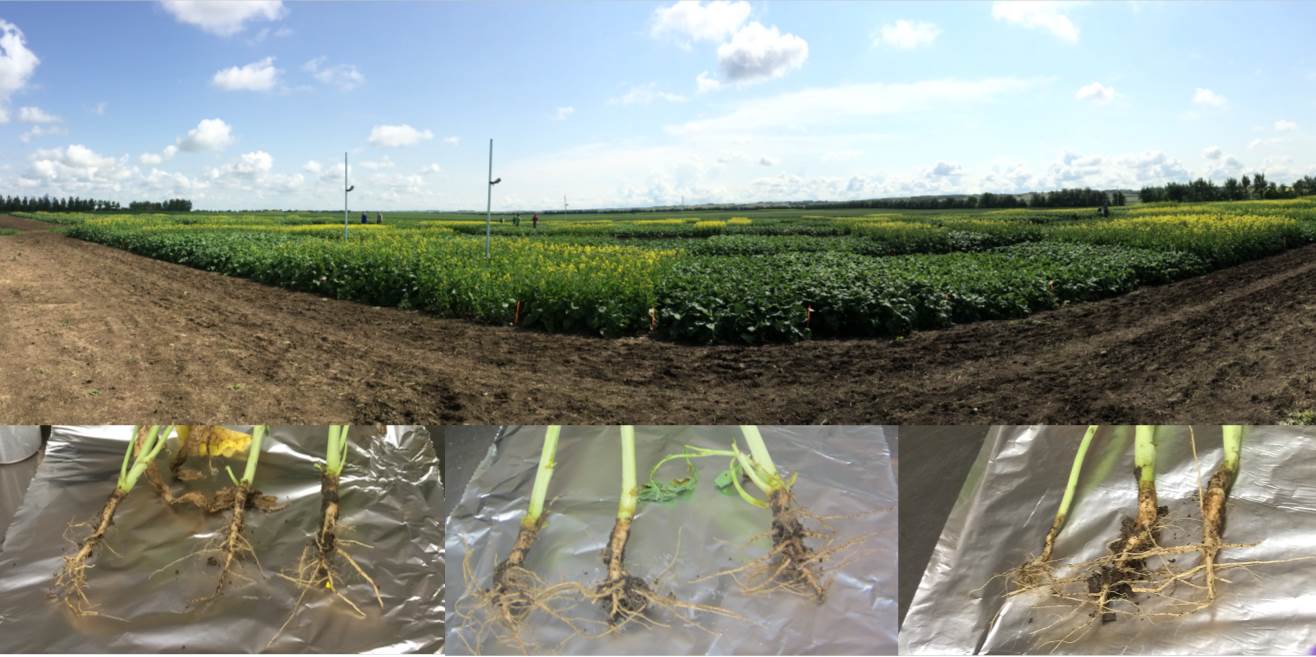Project Goal
To link microbial communities to a plant’s genotype and learn about plant and soil health.
Project Summary
A microbial community is a group of microorganisms, such as bacteria, fungi and viruses that share a common living space. For example, the human gut has a microbial community that affects our health. Microbial communities also exist in the soil, and play a role in how a plant develops and in its yield. However, little is known about how the soil and its’ components affect plant health.
Steven Siciliano, Bobbi Helgason, and their research team want to better understand these microbial communities that exist within the soil, and the interactions that occur between microbial communities and plant genotypes. Their ultimate goal is to characterize these microorganisms across genotypes, and understand how to encourage the microorganisms that are most beneficial to plant health. They are conducting their research in four parts: field work, lab work, bioinformatics and statistics, and interpretation.
Project Results to Date
Steven and Bobbi’s team have been taking samples of plant parts and soil in the field and analyzing their microbial communities using high-throughput sequencing methods. In 2016, they conducted an intensive study of sixteen different canola genotypes for a ten-week period. These studies focused on finding the key stage in a plant’s life when studying the plant is most beneficial. This work is important as resources for intense sampling over the course of a plant’s life is simply not possible.
This year, the scope of their research has been broader. The team focused on fewer canola genotypes (eight) across three different environments located in Melfort, Saskatoon, and Scott, Saskatchewan. The research question being asked was: How are patterns in the genotypes changing across time, climate, and soils? The team also looked for common patterns between the plants and the microorganisms they associate with. Sixteen genotypes of both canola and wheat were also sampled at three key plant growth stages, guided by findings from 2016 to capture year to year differences.
As researchers felt it was important to study overall plant health, Project 1.3 has expanded to include the microbiome of the seed and leaf as well as that of the roots and soil. Further, the team is using the PhytoPET and its’ Positron Emission Tomography (PET) at the Saskatchewan Centre for Cyclotron Sciences (Fedoruk Centre) to image phenotype roots in a relevant context to the surrounding microorganisms. This research method allows the researchers to explore how microbes are interacting with plant organs without destroying plant or root tissue.

Practical Applications
- Plant breeders do not traditionally gather information on soil characteristics that influence microorganisms. This research provides them with a wealth of new and better information on soil conditions, soil interactions, and genotyping, as influenced by the environment.
- This research looks at discovering if there is a core microbiome of organisms per plant genotype, and determining why some organisms are variable within the microbiome. This comes with further implications. Plants may be able to control their microbiomes, and we may be able to manipulate some of these variables or control mechanisms to encourage healthier, higher yielding plants.
- Farmers will receive superior genotypes from breeders that are optimized metaorganisms, rather than optimized plant genotypes. This takes advantage of a plant’s enormous microbial potential.
Collaborations
Project 1.3 works closely with various P2IRC Projects including:
- Project 1.1 Phenotype to Genotype: Moving from Model Systems to Crops and Project 1.2 Leveraging Field Phenomics for Advancing Key Rotational Crops to develop new tools and methods for analyzing and interpreting the data sequencing needed.
- Project 3.1 P2IRC Cloud provides infrastructure and support to Project 1.3 in collecting, storing, and analyzing its data.
- Project 3.2 Data Analysis for Rapid Plant Phenotyping and Project 3.3 Genotype & Environment to Phenotype to develop a larger computing infrastructure and develop statistical and bioinformatics methods to explore research questions on a greater scale.
Research Team
Project Leads:
Loading...
Researchers:
Melissa Arcand
Tim Dumonceaux
Jim Germida
Eric Lamb
Matt Links
PhD Students:
Jennifer Bell
Zayda Morales
Zelalem Taye
Shanay Williams-Johnson
MSc Students:
Tanner Dowhy
Fayruza Lalany
Research Associates:
Steven Mamut (August 2017-present)
Charlotte Norris (July 2016-July 2017)
Research Technicians:
Alix Schebel
McDonald Donkuru
Summer Research Assistants:
Cordell VanGenderen (2017)
Kira Bloomquist (2017)
Yolanda Iannucci (2017)
Lauren Reynolds (2016)


